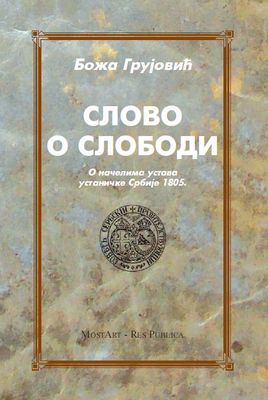
We kindly inform you that, as long as the subject affiliation of our 300.000+ articles is in progress, you might get unsufficient or no results on your third level or second level search. In this case, please broaden your search criteria.

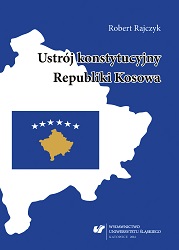
The publication presents the constitutional system of the Republic of Kosovo. Legal status of normative acts, which are the basis of this study, includes the December 2015. The publication used primarily applicable legal acts adopted by the constitutional authorities of the Republic of Kosovo in Albanian and English, as well as the normative acts of the Republic of Serbia in the Serbian language. The official websites of institutions of the Republic of Kosovo and the Republic of Serbia as well as international organizations and their representatives operating on the basis of Security Council Resolution 1244 in 1999 are also used as a source of information. // The references consist of the issues of geopolitics, history and political and social life of the Balkans. Not stating the words: independence or sovereignty in the documents of international law makes the issue of a unilateral declaration of independence by the Republic of Kosovo a keynote issue in political sciences research. // The monograph is intended for students of politics, journalists and the readers interested in the subject of complicated ethnic relations and political development in the Balkans region. There is in-depth analysis concerning the duties and obligation of the Kosovo’s authorities and the functioning of the Republic of Kosovo.
More...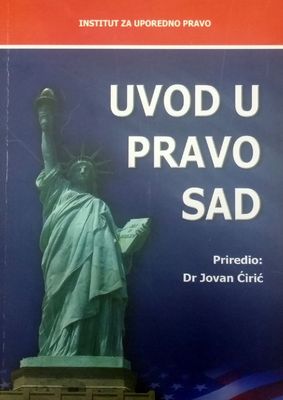
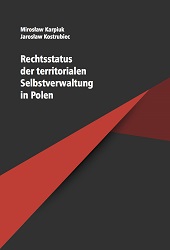
Das Buch drückt den Standpunkt der Autoren in den von ihnen diskutierten Aspekten der Funktionsweise der polnischen territorialen Selbstverwaltung aus. Die Monografie umfasst folgende Fragestellungen, die zugleich ihre Kapitel darstellen: Das Wesen der territorialen Selbstverwaltung; Tätigkeitsbereich der territorialen Selbstverwaltung; Die Behörden der territorialen Selbstverwaltung; Die Akte des Ortsrechts der territorialen Selbstverwaltung; Das Vermögen der territorialen Selbstverwaltung; Die Finanzverwaltung der territorialen Selbstverwaltung; Verbände, Vereinigungen, Vereine und Vereinbarungen der territorialen Selbstverwaltung; Aufsicht über die Tätigkeit der Organe der territorialen Selbstverwaltung. Nach 40 Jahren Unterbrechung wurde auf der Grundlage der Kommunalreform von 1990 die Institution der territorialen Selbstverwaltung in Polen wiederhergestellt. Als nächstes wurde infolge der sog. „zweiten“ Reform von 1998 die Selbstverwaltung auf der Ebene des Kreises und der Woiwodscha gebildet. Dank dieser beiden grundsätzlichen Etappen der Selbstverwaltungsreform ist es gelungen, ein auf dem Prinzip der Subsidiarität gestütztes System der öffentlichen Gewalt aufzubauen, das europäische Standards erfüllt. Vor diesem Hintergrund stellt sich die Frage, ob nach 25-jährigem Bestehen der wiederhergestellten territorialen Selbstverwaltung nicht die Zeit angebrochen ist, Veränderungen einzuleiten? Die Autoren sind der Überzeugung, dass man die gestellte Frage bejahen sollte, unter der Voraussetzung jedoch, dass der polnische Gesetzgeber den Weg der „Evolution“ und nicht der „Revolution“ wählt.
More...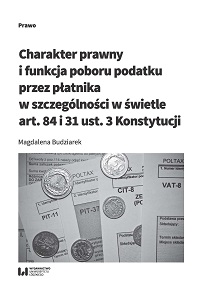
The dissertation is devoted to the legal character and the role of the withholding agent in tax collection (in particular in the light of Articles 84 and 31 sec. 3 of the Constitution). The purpose of the research conducted as part of the dissertation was – firstly – to determine the characteristics of the withholding agent’s major institutions, which were given the most attention, and – secondly ‒ to determine the proper relationship between the withholding agent’s duties and the payer's obligations, and thus the proper way of regulating his duties. //Monografia dotyczy istoty i charakteru prawnego obowiązków płatniczych. Mimo iż instytucji płatnika poświęcono w doktrynie wiele uwagi, poza zakresem zainteresowania nauki prawa podatkowego pozostała kwestia swobody, a wręcz dowolności ustawodawcy w nakładaniu obowiązków płatniczych na kolejne kategorie podmiotów czy też kwestie uciążliwości obowiązków płatnika oraz „stopnia” dolegliwości jego odpowiedzialności. Nie dostrzegano, że obecnie pozycja płatnika jest w istocie zrównana z pozycją podatnika, choć ich obowiązki na gruncie art. 84 Konstytucji Rzeczypospolitej Polskiej i przedmiot odpowiedzialności są inne. Doniosłość tych kwestii - w powiązaniu z powszechnością i powtarzalnością powstawania obowiązków płatnika - uzasadniały podjęcie nowych badań instytucji płatnika. Publikacja jest adresowana nie tylko do pracodawców, podmiotów wypłacających należności podlegające opodatkowaniu PIT i CIT, notariuszy, organów egzekucyjnych, komorników sądowych, lecz także do doradców podatkowych, adwokatów i radców prawnych prowadzących sprawy związane z wykonywaniem obowiązków płatniczych.
More...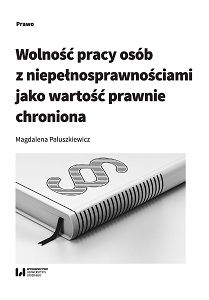
The main goal of the monograph was to assess regulations forming a legal protection model for the freedom to work in the case of the disabled from the perspective of their intended function, which has been to ensure the realization of the protected value in social life. Consequently, it became vital to establish the circumstances which influenced the emergence and the current shape of the model solutions for the protection of freedom to work for people with disabilities, and then to show different legal implementation tools which are utilized depending on the dynamically changing political, social and economic conditions, and on the shifting perception of disability itself. Pertinent international standards of guaranteeing the protection were examined. This established a context in which the author proceeded to evaluate the legal models appearing historically and currently in the Polish legislation. As a result, a set of postulates have been proposed for the implementation of necessary changes along with suggestions of new laws which would effectively put freedom to work of the disabled into practice, allowing for the current variables and dynamics of social life.
More...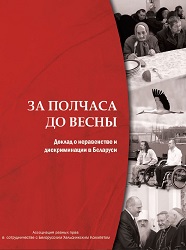
The purpose of this report is to identify the main areas, forms and causes of inequality and discrimination in modern Belarusian society through an analysis of legislation, administrative and judicial practice, as well as to formulate appropriate recommendations for the Belarusian authorities. The report consists of four chapters. The first of them covers the conceptual basis of the report and the methodology of its writing, provides basic facts about Belarus. The second chapter examines the situation of various vulnerable groups through the prism of equality and non-discrimination: religious, ethnic and linguistic, and focuses on groups whose problems of inequality are largely due to traditionalist attitudes in Belarusian society (women, people with disabilities and people living with HIV). as well as representatives of the LGBT community). A special group includes people who hold opposition views and beliefs. The third chapter of the report provides an overview of the international legal obligations of the Republic of Belarus in the field of equality and non-discrimination at the UN, OSCE and CIS levels, considers the features of the Belarusian national legislation and state policy, and also case law on this topic. (Published by Helsinki Committee in cooperationb with Association of Equal Rights)
More...
SPECIAL ISSUE as a report on the general situation of State and Society in Poland under Communist Rule (There is a bibliography and a list of statutory laws at the end of each article).
More...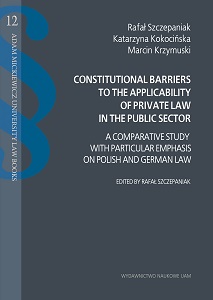
The underlying assumption of this book is that in the special environment that is the public sector, certain features of what we call civil law manifest themselves with particular force through contrast. An analysis of the application of civil law in the public sector is somewhat akin to an intellectual journey to the source of the Amazon. If one seeks a new, fresher view on civil law institutions and the civil law method of regulation, then this possible precisely through observing how they are applied in this particular environment. Observation of the application of the institutions of civil law provenance in the public sector actually prompts one to conduct a detailed analysis, which can be described as a kind of anatomy of civil law. It involves analyzing individual civil law institutions and arrangements, discovering their nature and the fundamental elements they consist of, as well as identifying the axiological and praxeological foundations that contributed to their development. The analysis carried out in the monograph indicates multiple relationships between civil law and constitutional law. The authors hope that this monograph will contribute to clarifying the relationship between these two branches of law. In this monograph, the authors raise the question whether, in the light of the provisions of the current Constitution, there are barriers standing in the way of using private law in the public sector. The authors respond in the affirmative to the question formulated in this way. In their opinion, due to the specific nature of the State and other public entities, some of the institutions of civil law lose their raison d'être in the public sector, and the nature of others undergoes change to a lesser or greater extent. This phenomenon can be observed, for example, in the sphere of exercising subjective rights by public entities, in the sphere of their tort liability, in their legal capacity and freedom of contract, as well as in relation to such institutions of law as unjust enrichment. The legislator and the public bodies applying these laws, in particular the courts, should take this phenomenon into account. Otherwise, there may be violations of the standards of the democratic state of law, including the constitutional rights and freedoms of citizens. In conclusion, the authors consider the need for developing a sub-branch of civil law which would find its application in the public sector.
More...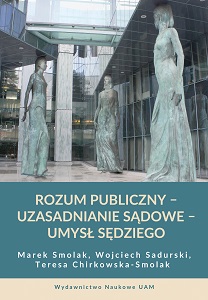
The book Public Reason - Judicial Justifications - the Judge's Mind provides a new perspective on legal arguments. This approach is underpinned by the conviction that in a situation of legal and moral pluralism, the argumentation should refer to public reason in the sense proposed by John Rawls and to his method of reflective balance. Furthermore, public reason can only be the basis for a new approach to legal argumentation if public authorities respect the rule of law. These two principles provide the framework for any discussion of arguments on public reason. Particular attention has been paid to the importance of the idea of public reason for the process of monitoring the constitutionality of the law and interpreting the constitution. It is argued that the unlawful motivations of the legislator marks the law it makes with the defect of unconstitutionality. The book also raises crucial questions about what characterises a good judge, how he or she makes decisions, how this process proceeds and the extent to which these decisions are 'rational'. From the perspective of cognitive psychology, it is shown on the basis of the results of the author's own research that decision-making by judges does not require them to have any particular moral competence. The book does not undermine confidence in judges and their decisions, it only points out the limitations of rational thinking and the mistakes they can make, just as the rest of us can.
More...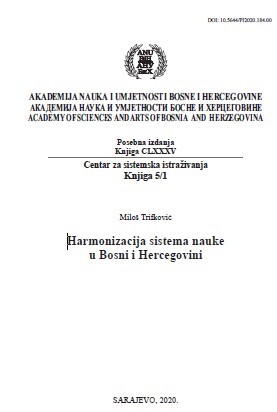
Znanje je izuzetno složena pojava individualne, grupne i društvene provenijencije koja izmiče preciznom definisanju i opšteprihvaćenom klasificiranju. Za potrebe ovog projekta “znanje” se može odrediti kao više ili manje sređen skup informacija i vještina vezanih za neku pojavu, za koje se osnovano zaključuje da su relativno tačne, pa stoga omogućava razumijevanje pojave i njeno neposredno ili posredno korištenje za jednu ili više određenih namjena. Najvažniji načini sticanja znanja su: tradicija, iskustvo, organizovano obrazovanje i nauka / znanost. Zaključivanje se može odrediti kao samostalan način sticanja znanja ili kao neizbježna komponenta svih prethodno navedenih puteva saznanja. U ovom projektu će akcent biti stavljen na znanje dobijeno naučnim / znanstvenim metodama (know why).
More...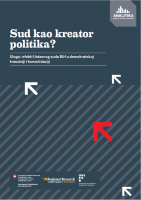
Činjenica jeste da je Bosna i Hercegovina (BiH) još uvijek, dvadeset godina nakon završetka rata, zemlja u tranziciji – od konfliktnog prema stabilnom postkonfliktnom društvu, ali i od “umjerenog autoritarnog socijalizma” ka demokratskom obliku vladavine sa drukčijim ekonomskim sistemom. Prema riječima Ustavnog suda Bosne i Hercegovine (USBiH ili Sud), tranzicija kao činjenica je “neporeciva”. Nadalje, zbog toga zemlja pokazuje “dominantnu tendenciju da se uključi u opće tokove internacionalizacije (prvenstveno s ciljem pridruživanja Evropskoj uniji), što implicira visok stepen demokratije u svim segmentima društva”. Štaviše, način izražavanja USBiH svjedoči jednom još konkretnijem značenju tranzicije, koje denotira da je prošlo dovoljno vremena da se učini otklon od diskriminatornih mehanizama dijeljenja moći, koji su na početku pravdani nužnošću, te pomak ka “pluralizaciji etnokracije”, ili, čak, njenom nadilaženju. Koja je adekvatna uloga Suda u tom procesu tranzicije? Još 1996. godine, u zoru nove ere Suda, prvi predsjednik postdejtonskog USBiH zapisao je tu opću dilemu napominjući da se od Suda očekuje da doprinese “zaštiti i daljnjem razvoju demokratskog, socijalno-političkog i pravnog jedinstva u zemlji”, ali da sâm pritom nikad ne postane “pisac ustava i zakona”. Ovaj izraz opće zabrinutosti iz prvih godina postojanja Suda nije bio popraćen istinskom debatom o pravoj ulozi USBiH u ustavnom sistemu BiH, što je začuđujuće, s obzirom na problematičnu prirodu Ustava, koji je rezultat Općeg okvirnog sporazuma za mir u Bosni i Hercegovini (Dejtonski sporazum). Štaviše, Ustav je uspostavio duboko decentraliziranu i nestabilnu državu, koju je jedan bivši sudija Suda nazvao “najslabijim federalnim sistemom na svijetu”, a drugi istinskom konfederacijom. Također je institucionalizirao nešto što Yee naziva “etničkim suverenitetom”, a to je određeni broj mehanizama dijeljenja vlasti koji su, zbog svoje često diskriminatorne prirode, u očitoj koliziji sa sveobuhvatnim i ukorijenjenim mehanizmima zaštite ljudskih prava. Fokusiran na takav ustav, koji je pružio okvir za sistem vladavine u kojem vlada “krhka demokratija”, USBiH se suočavao sa krupnim izazovom: s jedne strane, eksplicitno je bio zadužen za “podržavanje” tog i takvog ustava (član VI/3), a, s druge, čini se da je postojalo implicitno razumijevanje – s obzirom na sastav Suda, njegove ovlasti i pozicioniranje – da će Sud dati “lijek za potencijalne slabosti u strukturi vlasti” do kojih je doveo sâm ustav. Uloga USBiH u tim procesima transformacije većim je dijelom neispitana, a zanimljivijom je čini Ustav BiH kao činjenica: unatoč svim svojim nedostacima, on se pokazao kao žilav. Iako je primijećeno da se uspostavljanje “trajnog ustavnog rješenja čini veoma teškim, naročito u novim demokratijama izvan zapadne Evrope i Sjeverne Amerike”, BiH ima jedan od najstarijih ustava u regionu, koji je za dvadeset godina svog postojanja dobio samo jedan zvanični amandman, neznatne važnosti. Usprkos činjenici da zemlju i dalje odlikuje duboko podijeljeno društvo i nestabilan politički sistem, za te dvije decenije njen ustavni sistem se značajnije promijenio. Iako USBiH i dalje odbija definirati oblik strukture vlasti, uporno se držeći stava prema kojem “kompleksnost ustavnog poretka u BiH indicira sui generis sistem”, broj prenesenih i preuzetih ovlasti na državnom nivou, te prateće uspostavljanje brojnih novih institucija sugerira da je BiH danas jedna robusnija asimetrična federacija. Politički režim konsocijacijske demokratije, naročito na nižim nivoima vlasti je – da se poslužimo terminologijom jednog od vodećih stručnjaka za Ustav BiH – također prošao značajnu transformaciju od “ekskluzivne” u “participatornu etnokraciju”. U tekstu koji slijedi iznosimo tvrdnju da je USBiH igrao važnu ulogu u toj neformalnoj ustavnoj transformaciji, uglavnom putem ovlasti za apstraktnu ocjenu ustavnosti, i to na dvije osi: u odnosu na strukturu države i u odnosu na politički režim u zemlji. Takav će fokus pomoći u ispitivanju Suda kao političke institucije i kreatora politika. U ispitivanju doprinosa koji je USBiH dao procesu demokratske tranzicije, konsolidacije i socijalne transformacije u BiH, koristimo se pristupom studije slučaja na više nivoa, pri čemu s jedne strane gledamo Sud kao instituciju, a s druge se fokusiramo na njegove konkretne odluke. Imajući to na umu, u prvom dijelu članka istražujemo ovlasti, sastav i pozicioniranje USBiH, te pokušavamo utvrditi na koji su način institucionalne značajke Suda utjecale na njegov ukupni rad. U drugom dijelu naročito se fokusiramo na pitanje: u kojoj se mjeri može reći da je Sud bio aktivistički, te također pokušavamo karakterizirati prirodu njegovog aktivizma i razumijevanje samog tog pojma u bosanskohercegovačkom kontekstu. To činimo širokim pregledom prakse USBiH na relevantnim poljima, ali, u trećem dijelu članka, i putem detaljne analize njegovih kapitalnih odluka. Na kraju, koncentriramo se na učinke aktivizma i njegove posljedice po legitimitet Suda.
More...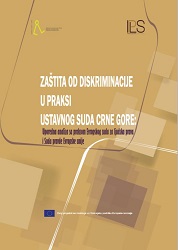
Nizak nivo poznavanja problema zaštite od diskriminicije i poznavanja samog koncepta diskriminacije dovodi do neadekvatne zaštite prava građana Crne Gore pred nacionalnim pravosuđem. U najširem smislu koncept diskriminacije predstavlja suprotnost principa jednakosti, te stoga u načelu podrazumijeva koncept nejednakosti. Dakle, princip jednakosti pred zakonom i princip zabrane diskriminacije predstavljaju dvije strane iste medalje. Diskriminacija ne predstavlja prosto pravljenje razlike, već je riječ o njenom negativnom, odnosno pežorativnom smislu: diferencijacija koja ne odgovara stvarnoj razlici, već stavlja jednu kategoriju lica u lošiju poziciju od one koju zaslužuju. Dakle, zabrana diskriminacije ukazuje na kriterijume diferencijacije (različitog tretmana) koji nisu dozvoljeni. Kompleksnost društvenih odnosa uslovljava postojanje više vrsta diskriminacije koji su prepoznati kako u praksi nadnacionalnih sudskih instanci tako i u praksi nacionalnog pravosuđa.
More...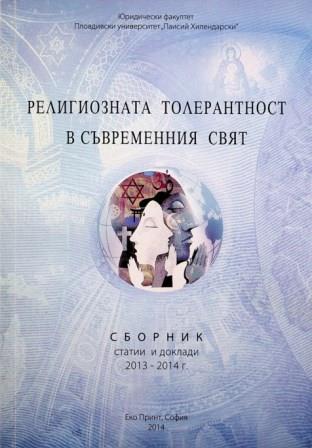
The collection includes reports presented in 2013 and 2014 at the series of organised scientific events connected with the research project "Religious tolerance".
More...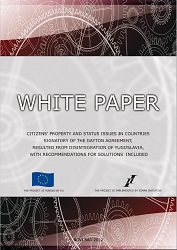
In the framework of the Igman Initiative's further strategy, program for the following period includes a number of important activities related to finding permanent solutions for citizens' property and status issues in countries signatory to the Dayton Agreement. Igman Initiative upholds the view that only efficient addressing of certain outstanding issues between Dayton Agreement countries may speed‐up further normalization of their relations and EU integration processes. At the beginning of the past decade, initiation of the process of democratization of the signatory countries of Dayton Agreement set off a number of initiatives aimed at addressing numerous problems in mutual relations. In many spheres, legislation was harmonized and reconciled with European legislation, a number of bilateral agreements were signed and a considerable number of outstanding issues were approached in practice. It was a contribution to amendment and improvement of mutual relations and cooperation. In spite of those efforts, a number of issues remain open, including citizens' status and property issues. There are several reasons for this state of affairs. First comes from the fact that these issues are closely connected with the issues concerning refugees and displaced persons, for which sufficient political will is lacking. This project is being implemented in the midst of significant ongoing regional initiatives aimed at finding permanent solutions for citizens of the signatory countries of Dayton Agreement, who were victims of gravest and widespread forms of violation of human rights, in particular refugees and displaced persons. Upon the initiative launched by European Commission, OSCE and UNHCR, the representatives of countries in this region: Bosnia and Herzegovina, Croatia, Serbia and Montenegro, have adopted the Sarajevo Declaration in January 2005, and took on an obligation to facilitate the return and local integration of refugees and displaced persons in their countries through joint activities and mutual cooperation. However, in spite of additional incentives and initiatives from the international community, not much progress was made in implementation of the Sarajevo Declaration, which had aimed to finalize the process of return of refugees in the region by the end of 2006.
More...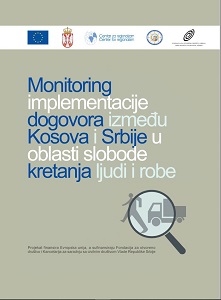
The project Monitoring the implementation of the agreement between Kosovo and Serbia's freedom of movement and goods is the continuation of the freedom of movement of people and goods between Serbia and Kosovo, which implemented the Center for Regionalism during 2011. and 2012. years. Years. The results of this project have shown what the importance of expert engagement of non-governmental organizations in such important areas, because they are good as a corrective factor in relation to state bodies, but also to the international community. It is not up to reminds that one of the effects of this previously realized project of the Government of the Republic of Serbia from 2006. years on the exemption of the Northern Part of Kosovo, Petro Date and Mobile Telephony, which applied huge damage to budgets and Serbia and Kosovo.
More...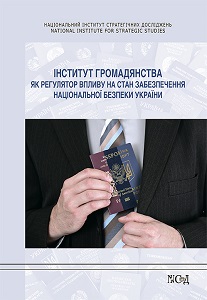
The analytical report offers the results of a study of a number of problematic issues related to the acquisition and loss of Ukrainian citizenship. The content and forms of the constitutional and legal regulation of citizenship in Ukraine are studied and attention is focused on the existing problems of legislative support for the functioning of the institution of citizenship, as well as the most optimal ways of its improvement are determined. It was concluded that in modern social and political conditions, the institution of citizenship has become one of the factors that significantly affects the state of ensuring Ukraine's national security. It is proposed to consider citizenship as one of the main elements of the mechanism of admission to participation in the management of state affairs and removal from such participation of persons who have committed crimes against the foundations of national security, peace, human security and international legal order, including during the armed conflict on the territory of Donetsk and Luhansk regions. The theoretical and practical issues of multiple citizenship are considered, the results of the study of the current state of its legislative regulation in Ukraine are presented. An analysis of individual legislative initiatives for solving problems related to the determination of the directions of state policy in this area of legal relations was carried out, and proposals were formulated for possible ways of their settlement at the national and international levels.
More...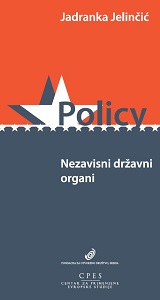
According to the principle of separation of powers in a system of electoral representative democracy, the parliament (first branch), the government (second branch) and the judiciary (third branch) are the backbone of the institutional arrangements of democratic states. The separation of powers implies that each of the three branches of government is independent of the other two. At the same time, their mutual relations are based on the principle of mutual limitation and control. The same applies to Serbia.
More...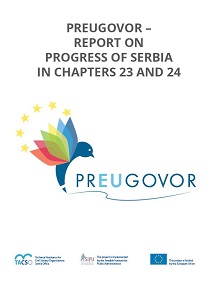
Over the past six months, the coalition PrEUgovor has been monitoring the state of play regarding the key policy areas in the process of Serbia’s accession to the EU. These areas include the political criteria and policies covered under chapters 23 and 24 of the European acquis in the negotiation process. The monitored period was marked by two key events: the release of Screening Reports for chapters 23 and 24 by the European Commission, and drafting of the Action Plans for these two chapters. Additionally, the Progress Report for Serbia for 2014 was released by the EC in October, so this report is envisaged as a commentary and an update to this document. This report presents concrete case studies, well researched and documented by the coalition’s members, in order to illustrate problems in the areas covered. Lastly, it also contains comments on the Action Plan draft for chapter 23.
More...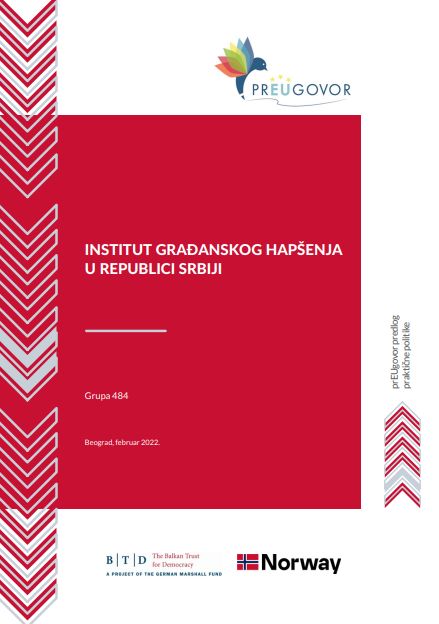
The concept of citizen's arrest in Serbian law lacks clear regulation and precise conditions for application, leading to legal ambiguities and potential misuse. The current legal framework allows any person to arrest someone caught in the act of committing a crime prosecuted ex officio, but it does not specify the limits of force or the arrestor’s legal awareness, which creates risks for human rights violations. Comparative analysis shows regional variations in terminology and regulation, with some neighboring countries not recognizing the concept at all, emphasizing the need for clearer legal definitions and proportionality in practice.
More...